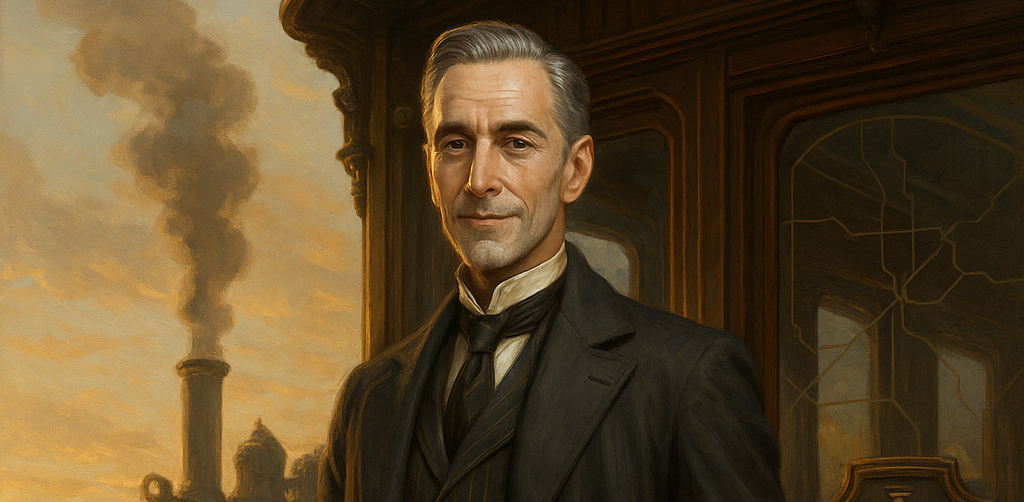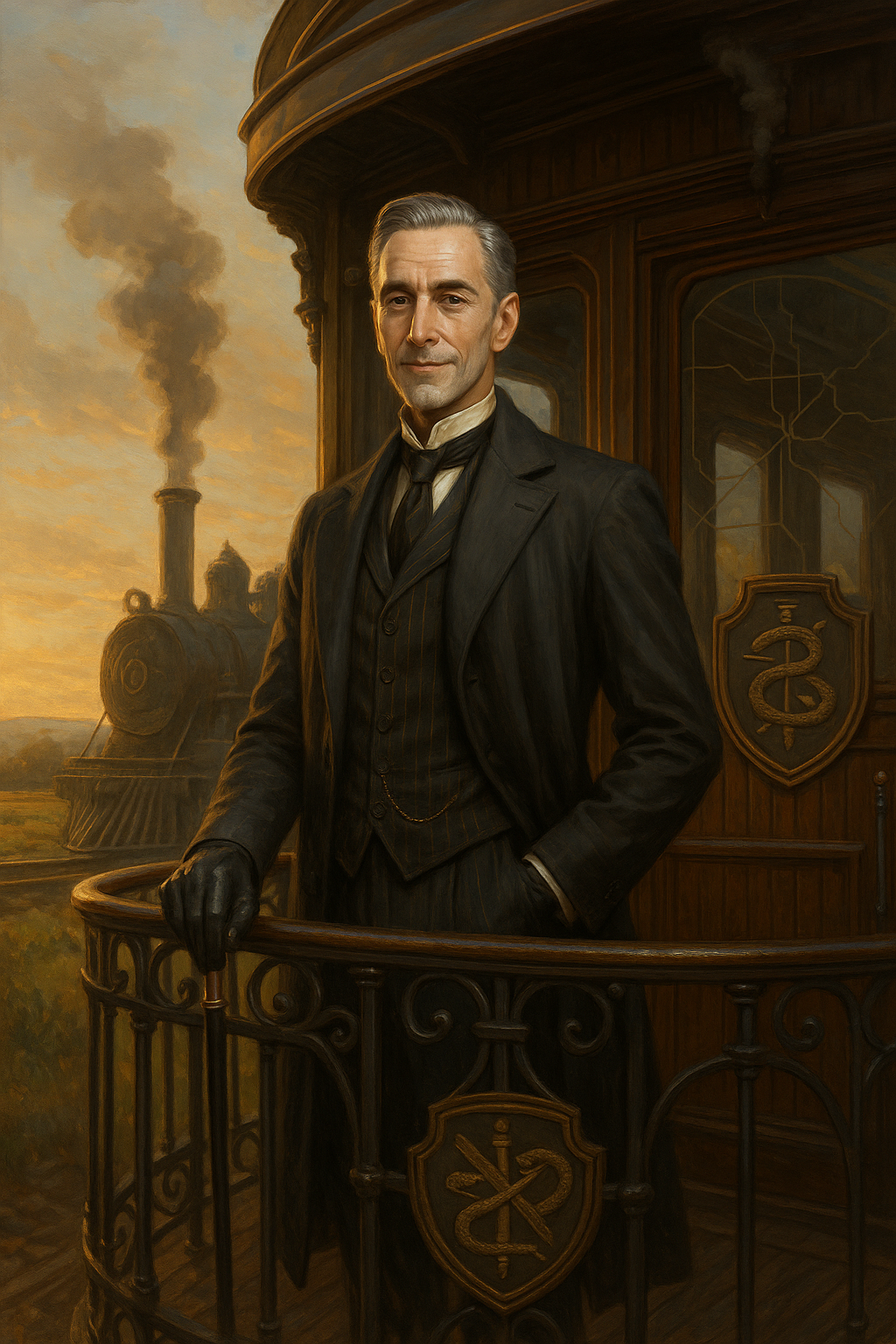Leander J. Vexlin
"The railroad don’t run through the country, son. It decides where the country begins and ends."
Aliases: The Black Tie Baron, King Leander, The Gentleman of Iron
Real Name: Leander Jules Vexlin
Home: Vermilion Hill Estate, Southern Louisiana (primary seat Private car #9, “The Sable Providence” (mobile office)
Birthplace: Baton Rouge, Louisiana, USA
Gender: Male
Height: 6'2"
Weight: 210 lbs
Build: Lean and composed, with wiry strength and old duelist’s posture
Hair / Style: Dark silver; slicked back and oiled; short beard, immaculately trimmed
Eyes: Charcoal gray, with a hint of violet that looks unnatural in the right light
Ancestry: French-Louisianan Creole, with rumored ties to older colonial bloodlines and Acadian exorcists
Skin: Olive-ashen complexion, smooth and oddly ageless
Occupation: Chief Executive of the Vexlin Continental Line, former state senator, rail magnate, land-broker, and undeclared warlord
Affiliation: Owner of multiple railroad companies, discreet patron of Dr. Virelow, backer of several eastern industrialists, rumored ties to occult groups along the Atchafalaya basin
Current Status: Active – expanding western operations aggressively; rarely seen outside his private railcar or the shaded decks of his estate
Iron Frontier Threat Classification: Steel Grade / Veil 2 (confirmed associations)
Modifier Tags: R – Ritual Adjacent, V – Veil-Aware, W – Warden of Territory, P – Political Weapon
Background
Leander Jules Vexlin was born in 1834 in Baton Rouge, Louisiana—the third son of a proud but decaying Creole family clinging to old titles and fading sugar money. His father died owing more than he owned, and his two older brothers tore the remains apart in lawsuits and whiskey. While they squabbled and sank, Leander watched. Quiet. Precise. Forgotten.
He began where no one thought to look: swampland, disputed borders, half-drowned farmland where flags didn’t fly long. He acquired land others laughed at. Land that flooded. Land where cattle sank and foundations rotted. But Leander didn’t want to raise cities—he wanted to lay rails. And swampland? Swampland could be bridged.
His first fortune came in rusted steel and silence—reclaimed telegraph poles, stolen military-grade bolts, timber from “abandoned” millgrounds. His second fortune came from surveyor camps, sloppily mapped, and slowly absorbed into “land improvement” trusts. His third was blood money: supplying both sides during a borderland uprising, then claiming the battlefield’s mineral rights when no one was left to argue.
By the time Reconstruction was underway, Vexlin had built an empire not just on metal, but on absence. He erased towns with rerouted lines. Buried lawsuits in black ink and burned ledgers. Judges who ruled against him lost re-elections or simply vanished. When rail barons out east finally noticed his name, it was already on five charters, three banks, and a telegraph line that didn’t follow any known geography.
But money alone doesn’t explain Leander Vexlin.
Not fully.
Old families in southern Louisiana speak his name in the same breath as certain other names—names you bury in salt or stitch into trees. They whisper of veiled women who read bones and black mirrors buried beneath the floorboards of Vermilion Hill, his ancestral estate. They say he visits the same river every equinox, walking it barefoot before sunrise. That his shadow moves wrong in candlelight.
Vexlin has never once been seen performing any ritual.
But the oldest midwives in the Atchafalaya say he doesn’t have to.
Because something else does it for him.
He owns land no other man can settle. He buys silence from people who never spoke to begin with. There are sections of rail laid through dead forest where even the birds won’t nest—and the men who hammered those spikes won’t say a word about what they saw beneath the soil.
And yet… he’s a gentleman.
Always dressed to the nines. Polite. Cordial. Well-spoken, never hurried. He travels primarily in his private railcar, The Sable Providence—a black, velvet-lined monstrosity of brass and quiet doors, rumored to contain a room no one enters twice. Governors dine with him. Generals toast him. Inventors sell him blueprints before they even file the patent.
And when he wants a town wiped off the map, he doesn’t send soldiers.
He sends a construction crew.
Or a lawyer.
Or, when necessary, Dr. Elias G. Virelow.
Vexlin funds men like Virelow not because he shares their ideology—but because fires clear land. Because chaos makes people forget where the tracks were meant to run. He’s not loyal to anything but the Path—his term for the ever-growing line of iron and ink that splits the West in half.
He fights his own battles when needed. Carries a silver cane with an old dueling blade concealed within. Still drills with pistols on the back of his estate. Not for show—but for memory.
Some say he hasn’t aged in twenty years.
Some say the pen he signs his contracts with—carved from drowned cedar, capped in bone—was stolen from something that should not have been found.
Some say he doesn’t believe in God.
But ask anyone who’s worked for him what he believes in and they’ll answer the same:
“Timetables. And the price of being late.”
Abilities / Skills / Powers of Note
Corporate Influence & Political Immunity
- Controls rail, mineral rights, troop transport contracts, telegraph hubs, and 17% of frontier legal appointments
- Owns multiple newspapers and “ghost funds” behind major military supply chains
- Has the ears of governors, judges, and eastern financiers
Combat Skill (Classic Duellist)
- Trained with sabers and pistols in old Creole styles—lean, fast, lethal. Fights like a man who has never once planned to lose.
- Always carries a silver-topped walking cane and a .44 Derringer hidden in his jacket
- Known to execute his own betrayals—doesn’t delegate vengeance
Bayou Magic Access (Veil 2 – Passive/Ritualistic)
- Never shown to wield power himself—only that things bend when he walks near them
- Rumors include: dead birds flinching back to life in his wake; contracts signed in salt; an old black-eyed priestess on his payroll
- Some believe he has an object—an item that belongs to someone who never should’ve been found—and that he consults it
Personality
Leander J. Vexlin is the kind of man who never yells, never rushes, and never repeats himself. He is charismatic without warmth, eloquent without kindness, and charming only when it serves a purpose. His voice is low, even, and laced with the kind of Southern civility that always feels two steps away from a funeral sermon.
He does not debate. He corrects.
He does not threaten. He offers alternatives.
To meet Vexlin is to feel as though the conversation was over before it began. He controls tempo like he controls rail schedules—with precision and penalties for delay. He listens more than he speaks, but when he does speak, it’s with language sharpened to a legal edge. Even his compliments feel like contracts. Even his silence feels like a deadline.
There is no fire in him. No fury. Only pressure—the kind that cracks granite, bends steel, and makes men sign away whole counties for a mile of track and the illusion of progress.
Vexlin does not posture. He lets others posture at him, lets them speak too long, lets them puff their chests—then dismantles them with a question, a nod, or the simple act of walking away. Those who mistake his calm for hesitation often find their enterprises closed, their allies vanished, and their wagons repossessed before sunrise.
He is supremely patient. He plays games that last decades. He remembers everything—especially slights. He doesn’t believe in petty revenge. He believes in corrective forces, applied slowly, systematically, and in ways that ensure no one else forgets either.
And beneath all of that civility—beneath the polished shoes, the silver-topped cane, the genteel handshake—there is something cold. Something hungry. A presence that doesn’t just want to own the West—it wants to decide what the West becomes.
He doesn’t believe in nations. He believes in systems. Rail lines. Legal precedent. Infrastructure that outlives men and principles alike. Where others see borders, Vexlin sees margins. Where others see rebellion, he sees inefficiency. Where others see people, he sees resources, liabilities, and thresholds for pressure.
He has no use for idealists. No patience for sentiment. And no fear of violence—only the inconvenience of cleaning up afterward.
He trusts no one completely, not even Virelow. But he respects Virelow the way a general respects a plague—dangerous, useful, and best deployed where witnesses are minimal.
Vexlin is not a zealot. He is not unhinged. He is simply certain.
And certainty, when paired with wealth, reach, and secrets... becomes power in its final form.
Physical Description
Leander is elegance sculpted into cruelty. Always dressed in high-collared black with a polished railman's coat and gloves. His voice is smooth Southern drawl dipped in command. His cane is silver-capped and etched with a star-of-iron pattern said to have ritual significance.
He walks with the slow grace of a man who is never late and never rushed. His eyes seem dim in sunlight and luminous by firelight. No one’s seen him sweat. No one’s heard him laugh.
When he walks into a room, papers stop rustling. Clocks tick louder. And men forget what it means to disagree.










Comments